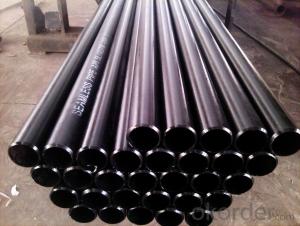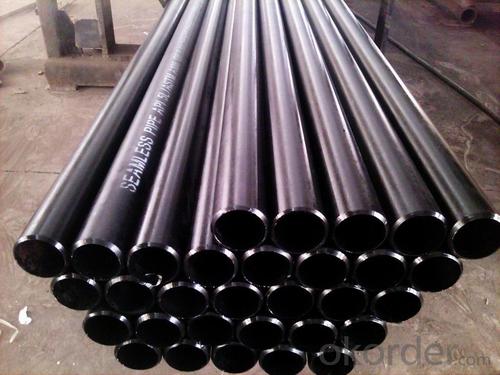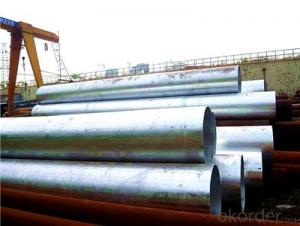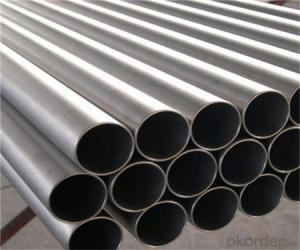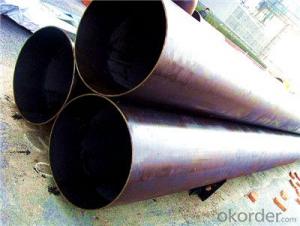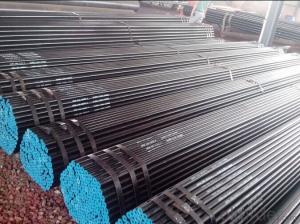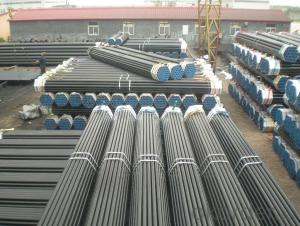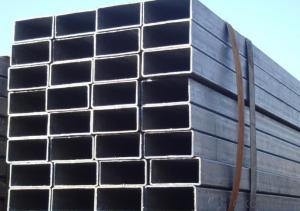Chinese Supplier Alloy seamless steel tube for sale
- Loading Port:
- China main port
- Payment Terms:
- TT or LC
- Min Order Qty:
- 50 m.t.
- Supply Capability:
- 10000 m.t./month
OKorder Service Pledge
OKorder Financial Service
You Might Also Like
Product Description of Chinese Supplier Alloy seamless steel tube for sale
| Products | Standard | Steel Grade/No. |
| Chinese Supplier Alloy seamless steel tube for sale | ASTM A213 ASTM A335 ASTM A209 | T2, T5, T11 ,T12, T22, P2, P11, P22, P12, P5 T1,T1a, T1b |
Others Alloy seamless steel tube is negotiable.
Specification of Chinese Supplier Alloy seamless steel tube for sale
Product size: Out Diameter: 14-114.3MM; wall thickness: 1.5-14MM
Provide MTC, can be BV, SGS, Lloyds and other three party testing agencies
The size tolerance, chemical composition, mechanical properties according to the corresponding standard supply
100% Eddy Current Test
Surface Anti-corrosive Treatment : impregnation, shot blasting, painting etc..
Product Packing : bare bundled packing, weave bags packing, composite plate packing, wood box packing
Delivery Time: 40-70 days
Pictures of Chinese Supplier Alloy seamless steel tube for sale
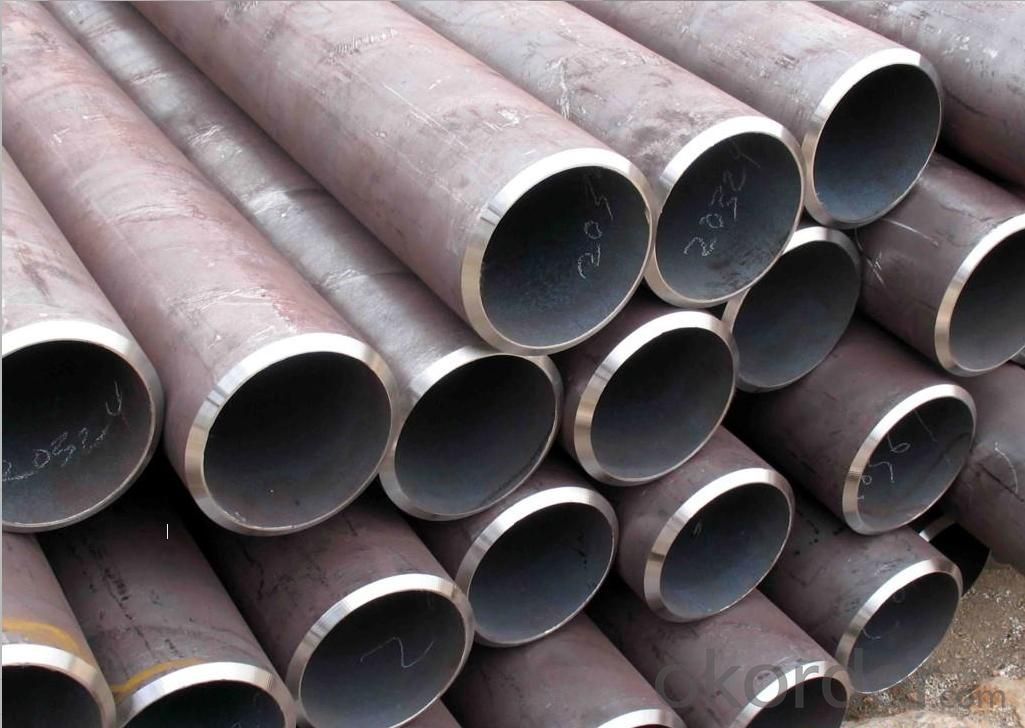
- Q: What are the different methods of pipe cutting for steel pipes?
- There are several methods of pipe cutting for steel pipes, each suited for different situations and requirements. Some of the most common methods include: 1. Manual Pipe Cutters: These handheld tools are commonly used for cutting smaller diameter steel pipes. They typically feature a cutting wheel that is rotated around the pipe, gradually creating a groove until the pipe is cut through. Manual pipe cutters are portable and relatively easy to use, making them suitable for on-site cutting tasks. 2. Hacksaw: Using a hacksaw is a traditional and cost-effective method for cutting steel pipes. This method requires physical effort and time, but it can be effective for cutting pipes with smaller diameters. It is important to use a fine-toothed blade and apply steady pressure to ensure a clean and precise cut. 3. Reciprocating Saw: Also known as a sawzall, a reciprocating saw is a power tool that uses a back-and-forth cutting motion to quickly and efficiently cut through steel pipes. These saws are versatile and can be used with different types of blades to handle different pipe sizes and thicknesses. 4. Band Saw: Band saws are commonly used in industrial settings for cutting large steel pipes. These saws feature a continuous loop of teethed metal blade that runs on wheels, allowing for precise and rapid cutting. Band saws are ideal for cutting large-diameter pipes and can be manually operated or fully automated for high-volume cutting tasks. 5. Pipe Cutting Machines: To achieve accurate and consistent cuts, pipe cutting machines are often used. These machines are designed to cut steel pipes with speed and precision, making them ideal for large-scale industrial applications. Depending on the specific machine and requirements, different cutting methods such as abrasive cutting, flame cutting, or plasma cutting can be employed. It is important to note that the choice of pipe cutting method depends on factors such as pipe diameter, thickness, location, precision requirements, and available resources. Proper safety precautions should always be followed when working with any cutting method to avoid injury or damage to the pipes.
- Q: Can steel pipes be used in earthquake-prone areas?
- Yes, steel pipes can be used in earthquake-prone areas. Steel is a strong and durable material that can withstand the forces generated during an earthquake. The flexibility and ductility of steel allow it to absorb and dissipate the energy of seismic waves, reducing the risk of structural failure. Additionally, the ability to weld steel pipes allows for the construction of robust and earthquake-resistant structures. However, it is important to ensure proper engineering and construction practices are followed to ensure the steel pipes are installed and connected correctly to maximize their earthquake resistance. Local building codes and regulations should also be considered to ensure compliance and safety in earthquake-prone areas.
- Q: How do steel pipes compare to other materials in terms of cost?
- Steel pipes are generally more cost-effective compared to other materials due to their durability and longevity. While the initial investment may be higher, their lower maintenance and replacement costs make them a more economical choice in the long run. Additionally, steel pipes can withstand harsh environmental conditions and are less prone to corrosion, reducing the need for frequent repairs or replacements.
- Q: What is the average lifespan of steel pipes in different applications?
- The lifespan of steel pipes in different applications can vary due to various factors, such as the quality of the steel, the environment in which they are used, and the maintenance and care they receive. Water supply lines typically have steel pipes that can last around 50 to 70 years on average. These pipes are often made of high-quality steel and experience less corrosive environments. However, the presence of corrosive substances, water chemistry, and soil conditions can significantly impact their lifespan. For industrial applications like oil and gas pipelines, steel pipes generally have a lifespan ranging from 20 to 50 years. These pipes are exposed to aggressive environments with high temperatures, pressure, and corrosive substances. Extending their lifespan can be achieved through regular inspections, maintenance, and corrosion protection measures. In construction applications, steel pipes used for structural purposes can last an average of 50 to 100 years or longer. These pipes are designed to withstand heavy loads and are often safeguarded by coatings or insulation to prevent corrosion. It's important to understand that these are average lifespans, and individual pipes may have shorter or longer lifespans depending on specific conditions. Ensuring the longevity of steel pipes in different applications can be achieved through regular inspections, maintenance, and timely repairs or replacements when necessary.
- Q: What's the material of Q325 steel pipe?
- Plain carbon structural steelIt's a kind of steel material. Q stands for the yield of this material, and the latter 325 means the yield value of this material, at around 325. And the yield value will decrease as the thickness of the material increases.
- Q: How are steel pipes tested for strength and durability?
- Steel pipes are typically tested for strength and durability through various methods, including non-destructive testing techniques such as ultrasonic testing, magnetic particle inspection, and visual inspection. These tests help identify any potential defects, cracks, or flaws in the pipes. Additionally, destructive tests like tensile testing and impact testing are conducted to measure the strength and toughness of the steel pipes. These rigorous testing procedures ensure that the pipes meet the required standards and can withstand the intended applications.
- Q: How are steel pipes used in firefighting systems?
- Steel pipes are commonly used in firefighting systems as they provide durability and resistance to heat, making them ideal for transporting water or fire extinguishing agents. These pipes are used to create a network of water supply lines, sprinkler systems, and hydrants that are crucial for effectively extinguishing fires and controlling their spread.
- Q: Can steel pipes be coated for aesthetic purposes?
- Yes, steel pipes can be coated for aesthetic purposes. Coatings such as paint, powder coating, or galvanizing can be applied to steel pipes to enhance their visual appearance and protect them from corrosion. These coatings can provide a variety of colors and finishes to suit different aesthetic requirements.
- Q: Are steel pipes suitable for use in food processing industries?
- Yes, steel pipes are suitable for use in food processing industries. Steel pipes are highly durable, resistant to corrosion, and can withstand high temperatures and pressures, making them ideal for transporting various food products and fluids. Additionally, steel pipes are easy to clean, maintain hygiene standards, and comply with food safety regulations, making them a reliable choice for the food processing industry.
- Q: What is the role of steel pipes in the transportation of chemicals?
- The role of steel pipes in the transportation of chemicals is to provide a safe and reliable means of transporting various types of chemicals over long distances. Steel pipes are highly resistant to corrosion, which is crucial when dealing with corrosive chemicals. They are also strong and durable, ensuring that the pipes can withstand the pressure and weight of the chemicals being transported. Additionally, steel pipes are able to maintain the integrity of the chemicals, preventing any leakage or contamination during transportation. Overall, steel pipes play a vital role in ensuring the efficient and secure transportation of chemicals.
Send your message to us
Chinese Supplier Alloy seamless steel tube for sale
- Loading Port:
- China main port
- Payment Terms:
- TT or LC
- Min Order Qty:
- 50 m.t.
- Supply Capability:
- 10000 m.t./month
OKorder Service Pledge
OKorder Financial Service
Similar products
Hot products
Hot Searches
Related keywords
